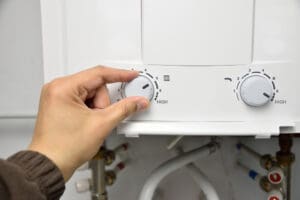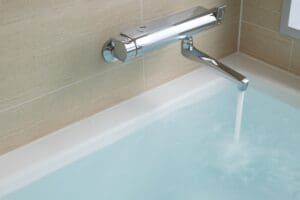
An increasing number of homeowners are looking for ways to save energy and make the most of their space. That’s why tankless hot water heaters have become a popular choice. These devices, also known as on-demand water heaters, offer the convenience of providing water only when it’s needed.
This means you can say goodbye to the wasted energy that comes with traditional water heaters. Are these modern appliances a good investment? Let’s explore the pros and cons of tankless water heaters so you can decide if it’s the right fit for your home.
Understanding Tankless Water Heaters
Also known as instantaneous or demand-type water heaters, tankless water heaters are standalone systems that provide hot water immediately upon request. They operate by allowing water to flow through the heater, where it’s rapidly warmed via thermal conductivity before being directed into your home’s plumbing system.
Tankless water heaters are a common choice among homeowners because they have the advantage of providing water without the need for a storage tank. This means you can enjoy a hot water supply whenever you need it. Their efficient and space-saving design only adds to their appeal.
Tankless Water Heater Benefits
Tankless water heaters offer several benefits that make them an excellent choice for your home.
Energy-Efficient Hot Water Heater

One of the key advantages of tankless hot water heaters is their energy efficiency. Unlike traditional tank heaters that continually heat a large volume of stored water, tankless heaters only heat water as needed. This on-demand approach can significantly reduce energy consumption and associated costs.
Endless Hot Water Supply
Tankless water heaters provide an almost endless supply of hot water. They heat water on demand, meaning you’ll always have hot water, even during peak usage.
Space Saving
Tankless water heaters are less than half the size of traditional tank heaters, making them ideal for homes with limited space. They can be installed in tight areas like closets or under sinks, freeing up valuable space in your home.
Longer Lifespan
Tankless water heaters usually have a longer lifespan than their tank counterparts. The absence of a water reservoir reduces the risk of rust and corrosion, extending the heater’s service life. This means less frequent replacement and potentially lower long-term costs.
Reduced Risk of Water Damage
Since tankless water heaters have no water storage tank, they pose a lower risk of water damage. Water damage usually occurs as a result of a corroded reservoir that leads to a leaking tank. A tankless model can protect your home from costly hot water leaks. You’ll never have to worry about how to stop a water leak.
What Are the Downsides of a Tankless Water Heater?
While tankless water heaters offer numerous benefits, they also have some drawbacks. These include complex installations, possible delays in hot water delivery, simultaneous usage limitations, and electricity reliance.
Complex Installation and Higher Upfront Cost
The installation of a tankless water heater is more complex than that of a traditional tank-based model. It often requires advanced venting, larger gas lines, and sometimes even electrical system upgrades. These complexities can result in higher upfront installation costs compared to conventional water heaters.
Potential Delay in Water Delivery
Though tankless water heaters provide hot water on demand, there may be a slight delay before the hot water reaches your faucet, especially if the heater is located far from the point of use.
Simultaneous Use of Hot Water Can Disturb the Hot Water Flow

While tankless water heaters provide an endless hot water supply, their flow rate limits how much hot water can be delivered at once. If multiple appliances or showers demand hot water simultaneously, the heater might need help keeping up.
No Hot Water During Power Outages
Unlike traditional tank heaters that store a reserve of hot water, tankless models require electricity to heat water instantly. This means you can only access hot water once the power outage is resolved.
How Long Does a Tankless Water Heater Last?
The life cycle of a tankless hot water heater varies based on factors like fuel type, maintenance, and water quality. Let’s explore the typical lifespans of various types of water heaters.
Gas-Burning Tankless Water Heaters
Gas-burning tankless water heaters can operate efficiently for 20 years or more. This is two to three times longer than the lifespan of conventional tank-type heaters, which typically last about ten years.
Oil Water Heaters
Oil water heaters have a lifespan similar to gas-burning tankless water heaters. Regular maintenance helps these heaters last for 20 years or more. However, they may require more frequent servicing due to the residue that oil combustion can leave behind.
Electric Water Heater Installation
Electric tankless water heaters usually have a lifespan compared to gas models, typically lasting around seven to ten years. However, they make up for it by requiring less maintenance and being generally easier to install. These advantages help compensate for the shorter service life.
Tankless Water Heaters
As mentioned before, tankless water heaters—whether powered by gas or electricity—tend to have a lifespan compared to tank heaters. Expect a tankless water heater to last up to 25 years.
Heat Pump Water Heaters
Heat pump water heaters have a reputation for being quite durable, typically lasting between ten to 15 years. These systems utilize electricity to transfer heat from the air or ground to water, resulting in peak energy efficiency.
What Homeowners and Professionals Say
When it comes to tankless water heaters, both homeowners and professionals have varied opinions.
Many professionals point out that tankless water heaters typically last longer than traditional tank models, with a lifespan of 20 years or more. However, homeowners should know these units require regular maintenance to maintain efficiency and longevity. Additionally, tankless water heaters may struggle to meet hot water demands and provide enough hot water for larger households in colder climates.
Overall, investing in a tankless water heater ultimately depends on personal preferences and hot water needs. It’s vital for homeowners to do their research and consult with water heater service professionals before making a decision.
The Leaking Water Heater: A Thing of the Past
Both traditional and tankless water heaters have their advantages and disadvantages. While tankless water heaters may offer longer lifespans and energy efficiency, they also come with a higher upfront cost and maintenance requirements. If you’re worried about cost, contact our team. We offer flexible financing options to help alleviate the burden of paying a large amount upfront.
At the end of the day, tankless water heaters are worth the investment because you don’t have to worry about a leaking water heater that will cause property damage. If you’re looking to upgrade your water heater, a tankless water heater is a great option. Schedule an installation today to get started.


